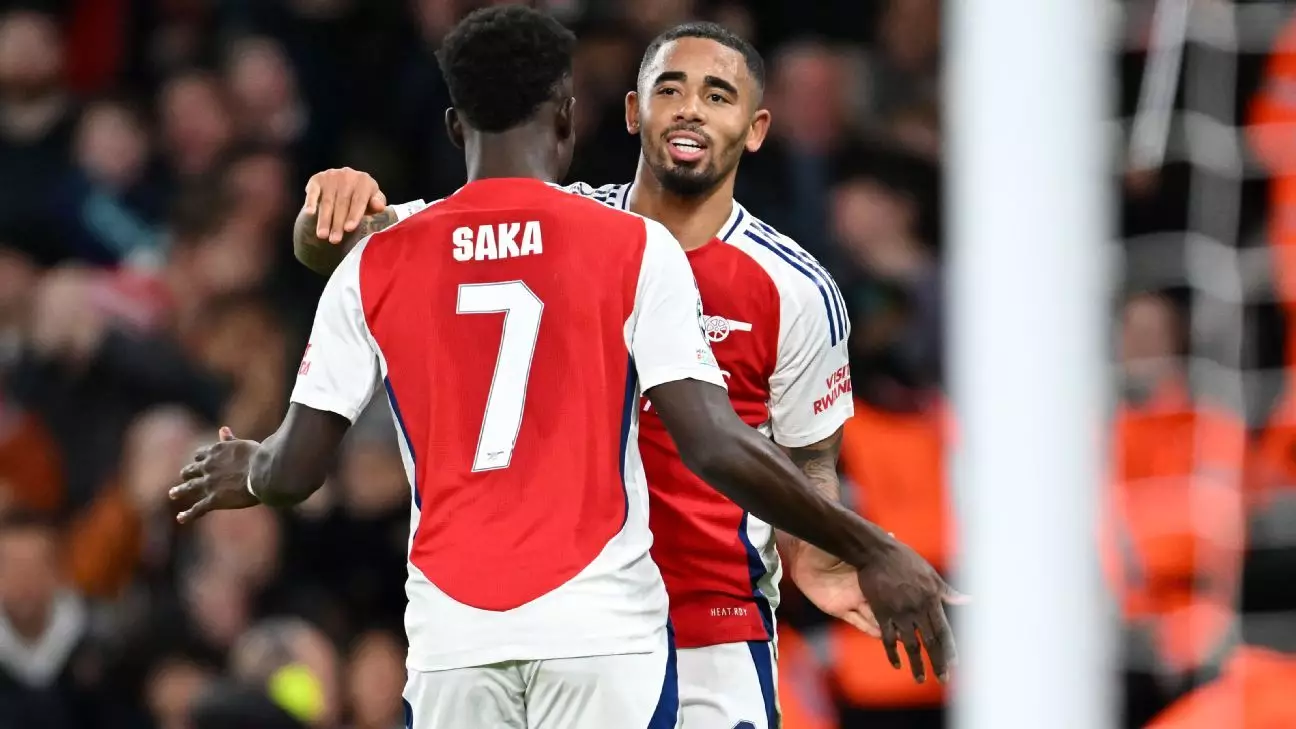Arsenal FC’s journey in the UEFA Champions League has taken a compelling turn, reflecting not only the evolution of the team’s dynamics but also highlighting the significance of emerging talents in football. The summer of 2022 saw the Gunners bolster their squad with the addition of Gabriel Jesus and Oleksandr Zinchenko, two players known for their winning mentality and experience acquired during their tenure at Manchester City. However, as the squad continues to flourish, one cannot help but analyze whether this duo represents an evolving past rather than a pivotal present.
In a recent clash against AS Monaco that ended in a solid 3-0 victory for Arsenal, fans and analysts alike witnessed the continued growth of the team’s younger stars while Jesus and Zinchenko’s contributions appeared to dwindle. Gabriel Jesus, once a fearsome striker, showcased signs of decline, missing critical opportunities that could have swung the game in Arsenal’s favor. Despite Jesus’s commendable assist for Bukayo Saka’s first goal, his inability to convert chances was glaring, culminating in a record of just one goal from his last 32 appearances. This statistic paints a worrying picture of a player who was once regarded as essential to the team’s attacking threat.
While Jesus’s experience was expected to stabilize Arsenal during intense matches against formidable European rivals, Saka’s performance exposed a shift in the team’s reliance. Saka, now regarded as a leader on the pitch, struck twice, proving instrumental in securing the victory. His consistency this season, marked by impressive goal involvements, places him among the Premier League’s elite. The evolution of the club’s attacking identity appears to pivot from the veteran contributions of Jesus to the dynamic interplay facilitated by younger talents like Saka and Kai Havertz.
Myles Lewis-Skelly’s inclusion as a starting player during this critical match highlighted Arteta’s faith in the academy’s products— a faith well-placed given the teenager’s composure and intelligence throughout the game. At just 18, Lewis-Skelly became the youngest Arsenal player to start a Champions League match since Alex Oxlade-Chamberlain, and he not only contributed defensively but also played a crucial role in moving the ball upfield. His performance raises questions about the necessity of seasoned players like Zinchenko, especially as Arsenal begins to cultivate a squad littered with young excellence.
Mikel Arteta has clearly articulated the importance of patience and growth within his squad, noting Saka’s drastic improvement since his teenage years. The Gunners have become a breeding ground for talent, allowing younger players the platform to shine on an important European stage. Saka’s rise, in particular, serves as an inspiring tale, showcasing how continual effort and focus can transform potential into performance. This narrative of development runs parallel to the need for experienced players, creating a delicate balance that Arteta must navigate.
While the result against Monaco stands as a testament to Arsenal’s potential, there exists a palpable tension surrounding the team’s ability to finish chances. Skipping over opportunities is a repeating theme that, if left unaddressed, could prove detrimental in future UEFA matches. Arteta openly criticized his players’ efficiency in front of goal, reinforcing the idea that this skill is a mindset that they must adopt, rather than simply an inculcated teaching tool.
Beyond immediate match performance lies the broader context of player acquisitions for the upcoming transfer windows. The club’s ambition is evident, yet difficult decisions loom—particularly concerning Jesus and his contract status. Movement in the transfer market will undoubtedly pivot on performances from key players, potentially determining their futures at the club. Arsenal’s hierarchy may soon prioritize enhancements to the forward line, which would test Jesus’s resolve as he fights to reclaim his spot among the essential cogs in Arsenal’s machinery.
The Gunners stand at a crossroads, where the interwoven narratives of experience and youth collide. While Gabriel Jesus and Oleksandr Zinchenko brought invaluable qualities to the squad, the emergence of talents like Bukayo Saka and Myles Lewis-Skelly illustrates a future that may be less reliant on veterans than initially thought. As Arsenal progresses in the Champions League, the emphasis on sharp executions and tactical finesse will be paramount. Success will hinge not just on the shoulders of the past’s key players but more significantly upon those rising stars eager to carve their mark in the annals of the club’s storied history. The narrative of Arsenal is not simply a tale of yesterday’s heroes, but a promising saga of the tomorrow’s legends.

